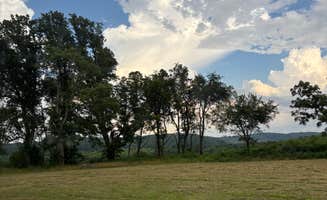Dispersed camping near Burkeville, Virginia focuses on public lands managed by the Department of Wildlife Resources. The region's central Piedmont location provides access to mixed hardwood forests with elevations ranging from 300-500 feet. Summer temperatures typically reach the mid-80s to low 90s, while spring and fall offer milder camping conditions with occasional heavy rainfall that can impact accessibility on unpaved roads.
What to do
Fishing opportunities: James River Wildlife Management Area offers access to multiple fishing spots along the river. Anglers frequently catch smallmouth bass, channel catfish, and various sunfish species during spring and summer months.
Wildlife observation: The wildlife management area provides habitat for white-tailed deer, wild turkey, and numerous bird species. Early mornings offer the best opportunities for wildlife viewing at James River Wildlife Management Area, where one camper noted, "I was unsure if I was in the right area. I never saw another person camping... I was the only one here all day."
Water activities: When water levels permit, the James River offers opportunities for canoeing and kayaking. Most sections near the wildlife management area feature Class I-II water difficulty, suitable for intermediate paddlers with basic skills.
What campers like
Peace and seclusion: The remote nature of James River Wildlife Management Area - Dispersed Camping provides a quiet experience away from developed campgrounds. According to one visitor, "The James River WMA is primarily used by hunters and fishermen throughout the year. However, one of the benefits of this place is that it is also open to dispersed campers!"
Affordability: Camping requires only a wildlife management area access permit ($4 daily or $23 annual), making it an economical option compared to developed campgrounds. All visitors must purchase this permit regardless of activity.
Convenience to towns: Despite the rural setting, campers appreciate the relatively quick access to necessities. Basic supplies are available within a reasonable driving distance, as one camper mentioned, "It is 20 minutes from the closest grocery store (Food Lion), liquor store, gas station, and propane supplier (Foster Fuels)."
What you should know
Permit requirements: All visitors to Hibernia State Rec Area and other wildlife management areas must purchase appropriate permits before camping. These can be obtained online through the Department of Wildlife Resources website or at authorized vendors.
Limited facilities: Dispersed camping areas have no designated amenities. No potable water, restroom facilities, or trash collection exists on site. Pack out all waste and bring sufficient water for your entire stay.
Seasonal restrictions: During hunting seasons (particularly fall and early winter), camping may be restricted in certain areas. Check with the Department of Wildlife Resources for current regulations before planning your stay.
Cell service variability: Network coverage varies significantly by carrier. T-Mobile reportedly provides reliable service at James River WMA, while AT&T coverage is minimal or non-existent, even with signal boosters.
Tips for camping with families
Site selection: When camping with children, select areas away from steep river banks and at least 300 feet from boat launch facilities. The main field entrance area at James River Wildlife Management Area provides the most level, open camping space.
Wildlife education: Bring field guides specific to central Virginia fauna and flora to create educational opportunities. Children can track wildlife sightings or create nature journals during their stay.
Weather preparation: Central Virginia experiences rapid weather changes, particularly during spring and fall. Pack additional layers and rain gear even during favorable forecasts to ensure comfort for younger campers.
Tips from RVers
Access considerations: The main entrance area at James River WMA can accommodate larger vehicles after turning onto the gravel access road from Midway Mills Lane. The field opening provides sufficient space for class A motorhomes and larger trailers.
Leveling requirements: Bring additional leveling blocks as the dispersed sites are not graded or designated. Most areas have slight slopes that require compensation for comfortable overnight parking.
Generator usage: While generators are technically permitted at some dispersed camping locations, be mindful of noise in these otherwise quiet environments. Consider solar options or limit generator use to daytime hours when other visitors are less likely to be disturbed by noise.


